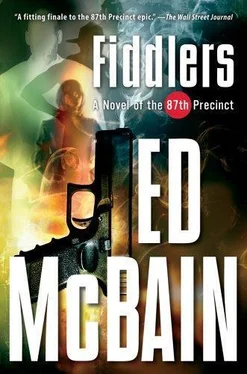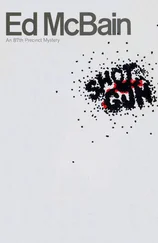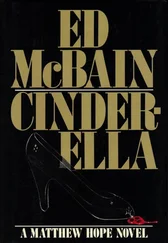Ed McBain - Fiddlers
Здесь есть возможность читать онлайн «Ed McBain - Fiddlers» весь текст электронной книги совершенно бесплатно (целиком полную версию без сокращений). В некоторых случаях можно слушать аудио, скачать через торрент в формате fb2 и присутствует краткое содержание. Жанр: Полицейский детектив, на английском языке. Описание произведения, (предисловие) а так же отзывы посетителей доступны на портале библиотеки ЛибКат.
- Название:Fiddlers
- Автор:
- Жанр:
- Год:неизвестен
- ISBN:нет данных
- Рейтинг книги:3.5 / 5. Голосов: 2
-
Избранное:Добавить в избранное
- Отзывы:
-
Ваша оценка:
- 80
- 1
- 2
- 3
- 4
- 5
Fiddlers: краткое содержание, описание и аннотация
Предлагаем к чтению аннотацию, описание, краткое содержание или предисловие (зависит от того, что написал сам автор книги «Fiddlers»). Если вы не нашли необходимую информацию о книге — напишите в комментариях, мы постараемся отыскать её.
Fiddlers — читать онлайн бесплатно полную книгу (весь текст) целиком
Ниже представлен текст книги, разбитый по страницам. Система сохранения места последней прочитанной страницы, позволяет с удобством читать онлайн бесплатно книгу «Fiddlers», без необходимости каждый раз заново искать на чём Вы остановились. Поставьте закладку, и сможете в любой момент перейти на страницу, на которой закончили чтение.
Интервал:
Закладка:
Ed McBain
Fiddlers
1.
THE MANAGER OF NINOTCHKR was a wiseguy named Dominick La Paglia. Not a made man, but mob-connected, with a string of arrests dating back to when he was seventeen. Served time on two separate occasions, once for assault with intent, the other for dealing drugs. He insisted the club was clean, you couldn’t even buy an inhaler in the place.
‘We get an older crowd here,’ La Paglia said. ‘Ninotchka is all about candlelight and soft music. A balalaika band, three violinists wandering from table to table during intermission, the old folks holding hands when they’re not on the floor dancing. Never any trouble here, go ask your buddies up Narcotics.’
‘Tell us about Max Sobolov,’ Carella said.
This was now eleven P.M. on Wednesday night, the sixteenth day of June. The three men were standing in the alleyway where the violinist had been shot twice in the face.
‘What do you want to know?’ La Paglia asked.
‘How long was he working here?’
‘Long time. Two years?’
‘You hired a blind violinist, right?’
‘Why not?’
‘To wander from table to table, right?’
‘Place is dark, anyway, what difference would it make to a blind man?’ La Paglia said. ‘He played violin good. Got blinded in the Vietnam War, you know. Man’s a war hero, somebody aces him in an alleyway.’
‘How about the other musicians working here? Any friction between Sobolov and them?’ Meyer asked.
‘No, he was blind,’ La Paglia said. ‘Everybody’s very nice to blind people.’
Except when they shoot them twice in the face, Carella thought.
‘Or anybody else in the club? Any of the bartenders, waitresses, whoever?’
‘Cloakroom girl?’
‘Bouncer? Whoever?’
‘No, he got along with everybody.’
‘So tell us what happened here tonight,’ Carella said.
‘Were you here when he got shot?’
‘I was here.’
‘Give us the sequence,’ Meyer said, and took out his notebook.
The way La Paglia tells it, the club closes at two in the morning every night of the week. The band plays its last set at one thirty, the violinists take their final stroll, angling for tips, at a quarter to. Bartenders have already served their last-call drinks, waitresses are already handing out the checks…
‘You know the Cole Porter line?’ La Paglia asked. ‘“Before the fiddlers have fled”? One of the greatest lyrics ever written. That’s what closing time is like. But this must’ve been around ten, ten thirty when Max went out for a smoke. We don’t allow smoking in the club, half the geezers have emphysema, anyway. I was at the bar, talking to an old couple who are regulars, they never take a table, they always sit at the bar. It was a slow night, Wednesdays are always slow, they were talking about moving down to Florida. They were telling me all about Sarasota when I heard the shots.’
‘You recognized them as shots?’
La Paglia raised his eyebrows.
Come on, his look said. You think I don’t know shots when I hear them?
‘No,’ he said sarcastically. ‘I thought they were backfires, right?’
‘What’d you do?’
‘I ran out in the alley. He was already dead. Laying on his back, blood all over his face. White cane on the ground near his right hand.’
‘See anybody?’
‘Sure, the killer hung around to be identified.’
Meyer was thinking sarcasm didn’t play too well on a mobster.
* * * *
The Sobolov family was sitting shiva.
Meyer had been here, done this, but today was the first time Carella had ever been to a Jewish wake. He simply followed suit. When he saw Meyer taking off his shoes outside the open door to the apartment, he took off his shoes as well.
‘The doors are left open so visitors can come in without distracting the mourners,’ Meyer told him. ‘No knocking or ringing of bells.’
He was washing his hands in a small basin of water resting on a chair to the right of the door. Carella followed suit.
‘I’m not a religious person,’ Meyer said. ‘I don’t know why we wash our hands before going in.’
This was all so very new to Carella. There were perhaps two dozen people in the Sobolov living room. Five of them were sitting on low benches. Meyer later explained that these were supplied by the funeral home.
All of the mirrors in the house were covered with cloth, and a large candle was burning in one corner of the room.
In accordance with Jewish custom, Sobolov had been buried at once, and the family had begun sitting shiva as soon as they got home from the funeral. This was now Friday morning, the eighteenth day of June. The men in the family had not shaved. The women wore no makeup. There was a deep sense of loss in this house. Carella had been to Irish wakes, where the women keened, but where there was also laughter and much drinking. He had been to Italian wakes, where the women shrieked and tore at their clothing. The prevailing mood here was silent grief.
The apartment belonged to Max’s younger brother and his wife. The brother’s name was Sidney. The wife was Susan. Both of Max’s parents were dead, but there was an elderly uncle present, and also several cousins.
The uncle spoke with a heavy accent, Russian or Middle European, it was difficult to tell which. He told the detectives stories about when Max was still a little boy. How his parents had purchased for him a toy violin that Max took to at once…
‘You should have seen him, a regular Yehudi Menuhin!’
The brother Sidney told them that his parents had immediately started Max taking lessons…
‘On a real violin, never mind a toy,’ the uncle said.
… and within months he was playing complicated violin pieces…
‘His teacher was astonished!’
‘He had such an aptitude,’ one of the cousins said.
‘A natural,’ Sidney agreed. ‘He was so sensitive, so feeling.’
‘The kindest person.’
‘Such a sweet little boy.’
‘When he played, your heart could melt.’
‘All his goodness came out in his playing.’
‘What a player!’ the uncle said.
Sidney told them that no one was surprised when his brother was accepted at the Kleber School, or when Kusmin put him in his private class. ‘Alexei Kusmin,’ he explained. ‘The head of violin studies there.’
‘Max had a wonderful career ahead of him.’
‘But then, of course…’ one of the cousins said.
‘He got drafted.’
‘The war,’ his uncle said, and clucked his tongue.
‘Vietnam.’
‘Twenty-fifth Infantry Division.’
‘Second Brigade.’
‘D Company.’
‘B Company, it was.’
‘No, Sidney, it was D.’
‘I used to write to him, it was B.’
‘All right, already. Whatever it was, he came back blind.’
‘Dreadful,’ Susan said, and shook her head.
‘It began at the hospital,’ his uncle said. ‘The drug use.’
‘Before then,’ his brother said. ‘It started over there. In Vietnam.’
‘But mostly, it was the hospital.’
‘Medicinal,’ his brother said, nodding.
‘The VA hospital.’
This was the first the detectives were hearing about drug use.
They listened.
‘And also, you know, musicians,’ one of the cousins said. ‘It’s prevalent.”
‘But mostly the pain,’ the uncle said.
‘Understandable,’ another cousin said.
‘Besides, everybody smokes a little grass every now and then,’ a third cousin said.
‘It should only be just a little grass,’ the uncle said, and wagged his head sympathetically.
‘And yet,’ his brother said, ‘right to the day he died, he was the sweetest, most loving person on earth.’
Читать дальшеИнтервал:
Закладка:
Похожие книги на «Fiddlers»
Представляем Вашему вниманию похожие книги на «Fiddlers» списком для выбора. Мы отобрали схожую по названию и смыслу литературу в надежде предоставить читателям больше вариантов отыскать новые, интересные, ещё непрочитанные произведения.
Обсуждение, отзывы о книге «Fiddlers» и просто собственные мнения читателей. Оставьте ваши комментарии, напишите, что Вы думаете о произведении, его смысле или главных героях. Укажите что конкретно понравилось, а что нет, и почему Вы так считаете.












